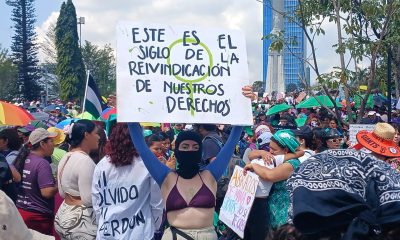News
El Salvador police officers sentenced to 20 years for killing trans woman
The U.S. deported Camila Díaz Córdova in 2017

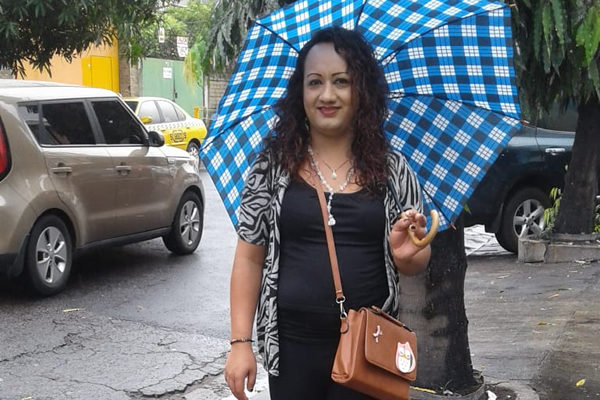
Editor’s note: The Los Angeles Blade published a Spanish version of this article on July 31.
SAN SALVADOR, El Salvador — Three police officers in El Salvador have been sentenced to 20 years in prison for the murder of a transgender woman in 2019.
“20 years in prison for three PNC (National Civil Police) officers for the murder of a member of the LGBTI community,” wrote El Salvador Attorney General Raúl Melara on his Twitter account after announcing the San Salvador court’s verdict against Carlos Rosales, Jaime Mendoza and Luis Avelar for kidnapping Camila Díaz Córdova on Jan. 31, 2019.
Díaz was found hours later with various injuries to her body. She died at Rosales National Hospital on Feb. 3, 2019.
Díaz’s friend, Virginia Flores, told the Los Angeles Blade the U.S. deported her in 2017 after she migrated because of the dangers the LGBTQ community — especially trans people — face in El Salvador.
“It is personally the least that I expected, but it is still no fair. It is half justice,” said Flores. “It was immediately clear that it was a hate crime, but I am pleased that they have sentenced these killers.”
The three police officers had their first court hearing on July 5, 2019, after they were charged with kidnapping and aggravated homicide as a hate crime. The judge did not admit the aggravating circumstance in the case.
“By not admitting the aggravating circumstance, the sentence did not reach 50 years in prison,” Mónica Linares, director of Aspidh Arcoiris Trans, a Salvadoran trans advocacy group, told the Blade. “Two previous hearings removed the aggravating circumstance because of lack of evidence.”
“It is regrettable that the reform to the criminal procedure code has yet to be applied and they do not consider hate crimes as such, since society in some way continues to validate violence against trans women,” Ambar Alfaro, founder of the Feminist Association of Trans People of El Salvador, told the Blade. “The judiciary sent a very clear message to the trans community and our struggles, but we obviously celebrate the fact that this is the first case to be prosecuted and that there is a conviction, although it was not what we believe is fair.”
Aspidh Arcoiris Trans in previous press conferences has said prosecutors have not charged anyone with a hate crime based on sexual orientation and gender identity since the provision was added to El Salvador’s Penal Code in 2015.
Aspidh Arcoiris Trans since 2017 has documented more than 20 murders of trans women between 16 and 32-years-old. Aspidh Arcoiris Trans also says a trans woman’s life expectancy in El Salvador is 33 years.
Although LGBTQ activists are partially satisfied with the results of Díaz’s case, there is still a fear these officers may appeal and their sentences will be reduced. They are also worried the officers could be released from prison early because of good behavior.
“As an institution, it is gratifying that at least they sentenced the murders of Camila Díaz Córdova, a trans woman, although it does no refer to the same prosecutor who used Camila’s name each day when referring to her,” said Linares.
The prosecutor always used Díaz’s birth name to refer to her.
“It is ugly to have a fight for the recognition of trans people’s identity, while a law doesn’t exist,” said Linares. “The authorities are those who are disrespecting (us).”
Díaz’s mother, Edith Córdova, in statements to Agencia Presentes, a Latin American press agency, said justice was done for her daughter because authorities captured those responsible and they received due process. Córdova nevertheless said the sentence will not take away the pain of her loss.
“My greatest feeling is that she will never be with me again, nobody will be able to erase that from my mind and my heart,” she said. “It is something very hard for me, it is difficult to accept.”
“Camila’s case will be the first crime against a trans woman that goes to trial and ends with a conviction,” Flores told the Blade. “This sets a precedent in El Salvador, a positive step in recognition of so many hate crimes that have gone unpunished.”
Los Angeles
Community members urge city council to invest in trans lives
Advocates introduced the TGI Wellness and Equity Initiative, a campaign that would direct crucial funding to trans, gender expansive and intersex community organizations.
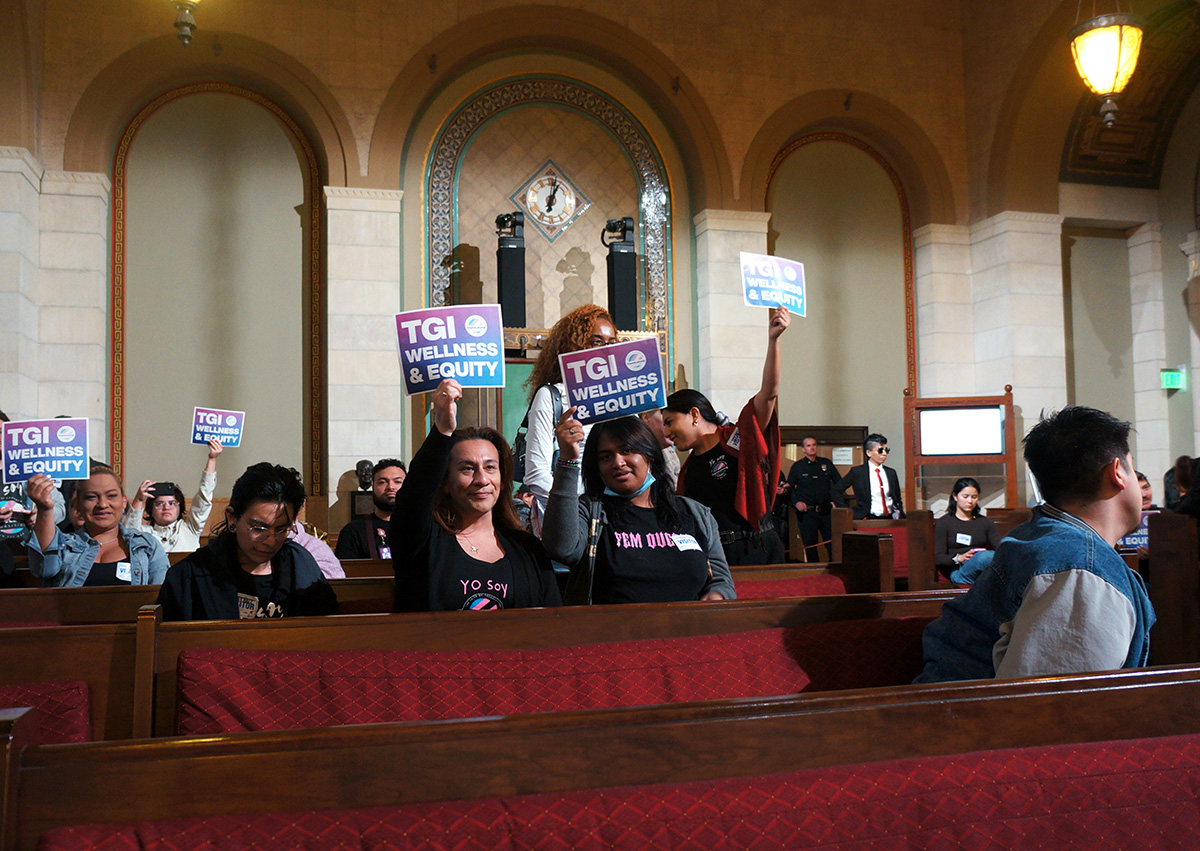
At 9 a.m. on Tuesday, ahead of L.A.’s regular city council meeting, a long procession of people wrapped around the entrance leading into the council chamber. Someone remarked that it was “unprecedented” to see so many people gathered, waiting to get inside. Several housing advocates and legal experts were waiting to make public comments about Measure ULA, otherwise known as the county’s “mansion tax.”
Another fifty or so transgender, gender expansive and intersex (TGI) advocates from the TransLatin@ Coalition (TLC), a long-standing organization that provides housing and meal support, legal services, mental health guidance and peer support groups, showed up to demand real, tangible support on behalf of themselves and their community members as the Mayor prepares the city’s budget on how funds will be allocated.
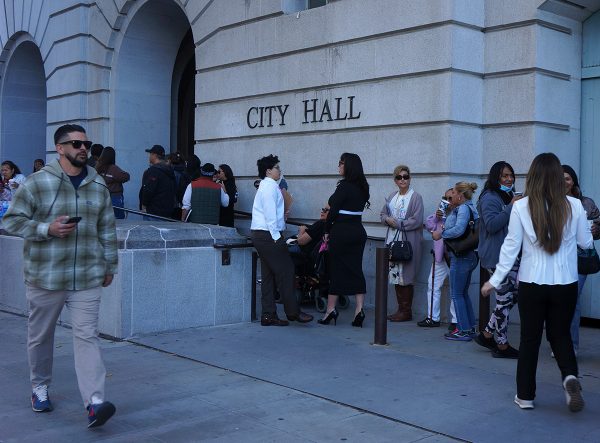
TLC advocates called on the city council to invest in their TGI Wellness and Equity Initiative (TGI WE), a two-year pilot program that would provide $4 million to five organizations that support the safety and rights of local TGI people. This money would expand each organization’s ability to hire more staff and expand their outreach, resources, and ability to serve a continually underserved community: TGI Angelenos who are multiply marginalized as violence against trans people and immigrants continues to increase.
During public comment, TLC president and CEO Bamby Salcedo requested that the council move forward with the initiative. Aside from general support, she asked that two council members act as co-sponsors and petitioners for the initiative. This way, TGI WE can be added as an official agenda item for future city council meetings, which would get the ball rolling for the initiative’s funding goals.
“Right now is the time to stand in solidarity with our community and stand against the federal government, who is attacking and trying to disappear trans people,” Salcedo told council members. Several other advocates, including TLC policy ambassador ChiChi Navarro, Christopher Street West board member NiK Kacy and Invisible Men director Jovan Wolf delivered passionate statements in support of TGI WE.
“Los Angeles is in a state of crisis, and our communities are running out of time,” Navarro told the council. They also spoke to the county’s growing investment in LAPD, while TGI organizations receive nothing. “This is not a resource shortage. It is a resource allocation choice [that] is costing lives. We need this council to introduce the TGI Wellness and Equity initiative immediately…We cannot wait. We need urgent investment today.”
TGI WE would fund community-run organizations that focus on individualized care that is facilitated with language support and sensitivity training, a kind of care that is crucial for TGI community members who often face criminalization and discrimination at the hands of law enforcement agents.
“We are their lifeline, and we demand your support,” Jovan echoed. “It’s time for the city of L.A. to make good on its promises to be for everyone…You and all of us know that we have been marginalized, pushed to the sidelines, and we continue to be an afterthought in your budgets and your agendas.”
When the meeting concluded, TLC members rallied together for a demonstration, calling out: “Support trans lives!” as council members filed out of the chambers.
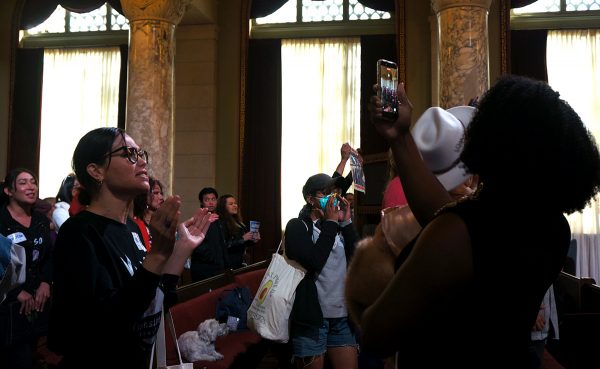
On the quiet walk back onto the street outside, Navarro reflected on the importance of this meeting and the effort community members made to be there. “A lot of the time, not just city council, [but] groups in general tend to forget trans people,” Navarro told the Blade. “Trans people are here. You saw today: clearly, we’re not a small pocket. I think we have to show them: we’re here [and] we’re not going anywhere.”
“It’s not great to be left in a place where you’re expected to continue to do the work, but without any actual support,” Navarro continued. Besides concrete funding, official citywide support for TGI WE would affirm that elected officials are willing to take a stance and take meaningful action when it comes to supporting TGI community members. “So it’s not just the money,” Navarro said. “L.A. has a motto, [that] L.A.’s for everyone. But I don’t know how you can say that when you’re not doing everything in your capacity to protect everyone.”
Kristie Song is a California Local News Fellow placed with the Los Angeles Blade. The California Local News Fellowship is a state-funded initiative to support and strengthen local news reporting. Learn more about it at fellowships.journalism.berkeley.edu/cafellows.
Los Angeles
UCLA’s long-standing LGBTQ+ alumni organization welcomes new president
The Blade sat down with paralegal studies professor and local advocate Bobby Rimas to talk about intersectional leadership and his goals for the UCLA Lambda Alumni Association.

As a young student studying history at UCLA, Bobby Rimas was grounded by his growing desire to give back to his community. He worked as a tutor for low-income students and became invested in learning about the ways intersectionality impacts people’s access to education and resources. “My barriers may not be the same as yours, and your barriers may not be the same as mine,” Rimas told the Blade. “How do you apply that in leadership [and] in the classroom?”
After 15 years of service to UCLA’s various alumni networks, first beginning with the Pilipino Alumni Association, Rimas became president of the university’s Lambda Alumni Association on Jan. 1. The UCLA Lambda Alumni Association was formed in 1989 as a way to support LGBTQ+ students and graduates with professional development, scholarship opportunities, mentorship, and other outreach support.
UCLA has long been a local epicenter of queer activism and advancement. Students formed groups like the Gay Student Union and Lesbian Sisterhood in 1969 and 1973, respectively, to empower and connect queer students. Queer art and culture also thrived in this time, as students saw the launches of the queer campus paper, magazine, and a film festival that centered on LGBTQ+ stories.
Administratively, campus officials were taking a stance against LGBTQ+ discrimination. In 1975, UCLA Chancellor Charles E. Young banned departments and programs from discriminating on the basis of sexual orientation.
In the decades since, leaders like Rimas are working to preserve this history and also build upon it. How can we inspire students in and out of the classroom? How do we make sure they have access to valuable resources and can advocate for themselves in places that are not always inclusive of their needs and identities?
Rimas often ponders these questions, both as president of the Lambda Alumni Association and at Cal State LA, where he works as an associate professor of paralegal studies. There is often cross-pollination in the concerns he receives from alumni members as well as his students: How do they find employers who are accepting of LGBTQ+ people? How do they avoid being discriminated against in the workplace?
These are questions Rimas hopes to tackle more in his role as president of the UCLA Lambda Alumni Association and in his continued tenure as an educator. One of his first goals is to expand the board and bring on more diverse perspectives to the organization. “More people means more activity,” Rimas said, who hopes that the combined knowledge and resources of the board can better serve students and alumni.
Rimas also hopes to throw a large Gala event, one that mirrors the extravagant, celebratory 2019 bash he organized for the association when he was first brought onto the team. 100 people attended, creating a wave of awareness for the organization and increasing their scholarship funding.
What’s next? UCLA Lambda Alumni Association’s first board meeting is this upcoming Monday. Rimas hopes to discuss strategies to grow the organization’s presence beyond the campus’ reach, in other queer cornerstones like West Hollywood, elevating diverse LGBTQ+ voices, and improving ways they can professionally support their network’s members.
Kristie Song is a California Local News Fellow placed with the Los Angeles Blade. The California Local News Fellowship is a state-funded initiative to support and strengthen local news reporting. Learn more about it at fellowships.journalism.berkeley.edu/cafellows.
Los Angeles
South L.A. celebrated Black joy and resistance at yesterday’s Martin Luther King Jr. Day Parade
The Blade also sat with staff from Center South, a community site that champions the safety and health of South L.A.’s LGBTQ+ communities of color.
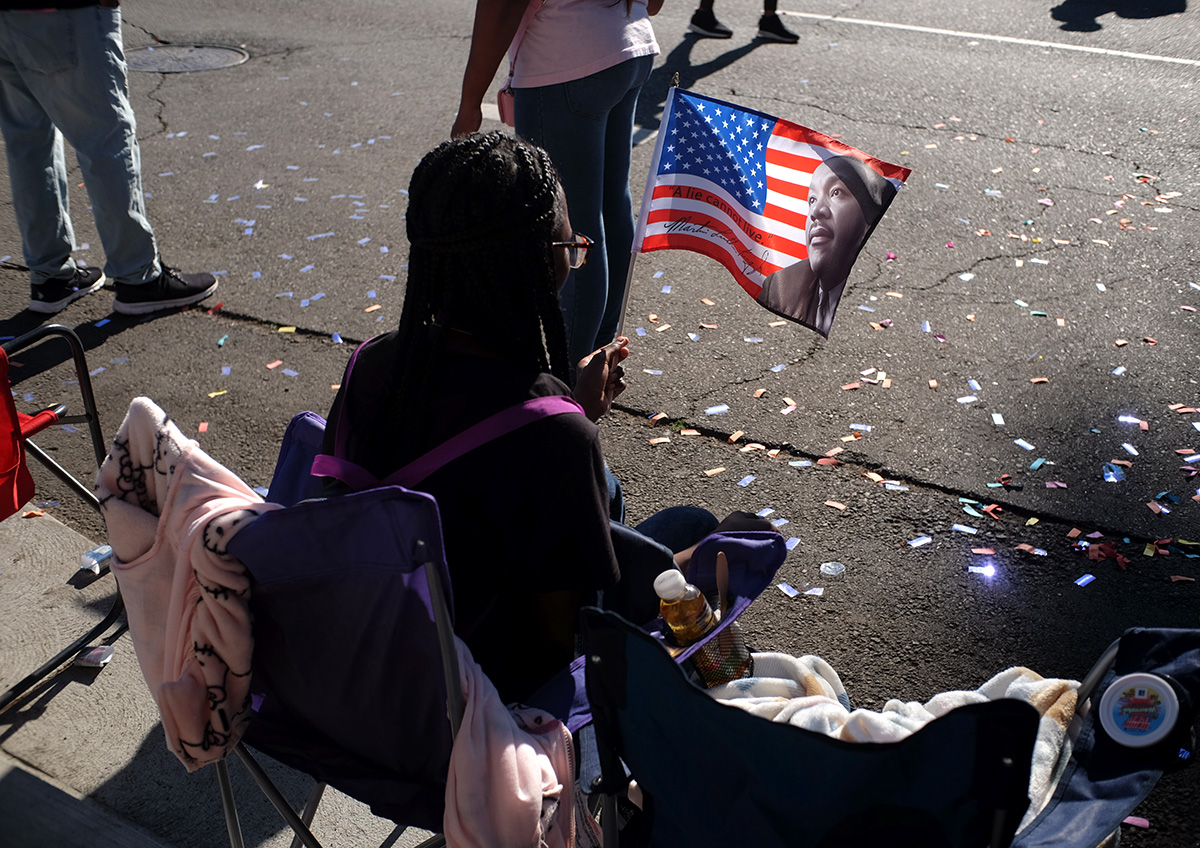
At 9 a.m. on Monday, Jan. 19, South L.A. community members gathered on the streets, holding onto lawn chairs and the hands of their children and family members. “Good morning,” one greeted. “Are you ready for the parade?” Neighbors laughed and hugged underneath the warm morning sun, staring into the horizon in anticipation of the county’s official Martin Luther King Jr. Day Parade, organized by Bakewell Media and the Los Angeles Sentinel Newspaper.
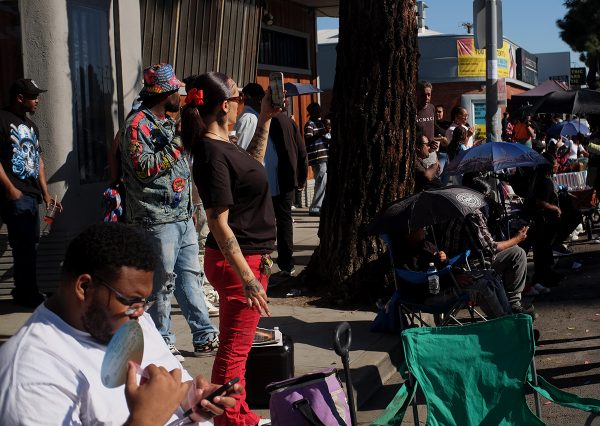
When the parade began an hour later, organizations like labor union SEIU Local 721, civil rights group Black Lives Matter Los Angeles, and HIV care and advocacy nonprofit AIDS Healthcare Foundation marched to cheers and waves from the crowd. Young musicians, drill and cheer teams from Marcus Garvey School and other schools stepped in unison, performing elaborate routines and sending jolting, infectious waves of drum and trumpet like electricity through paradegoers.
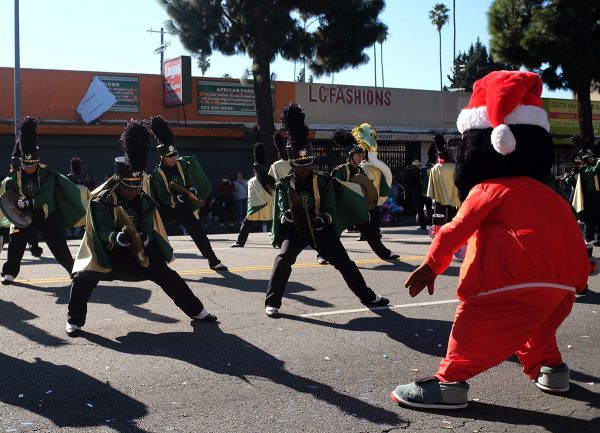
Black liberty and joy coalesced with a call to face injustice at yesterday’s festivities. Black Lives Matter Los Angeles members handed out flyers demanding accountability for Keith Porter, who was killed by an off-duty Immigration and Customs Enforcement (ICE) agent on Dec. 31. Marchers also waved the Iranian flag in solidarity with its people, who have faced increasing state-sanctioned violence after they began protesting the government in the midst of an economic downfall.
Communal care and empowerment remain, for many, the only way forward as trust in broader governmental systems and structures wanes. While celebrating the monumental work of the late civil rights activist, community members yesterday echoed an important, resonant message: The work is not yet done.
This community work is largely supported by local advocates and organizations like Center South: one of the Los Angeles LGBT Center’s community sites. Yesterday morning, ahead of the parade, senior program manager Steven Campa and fellow staff members welcomed people into the space for coffee and pastries.
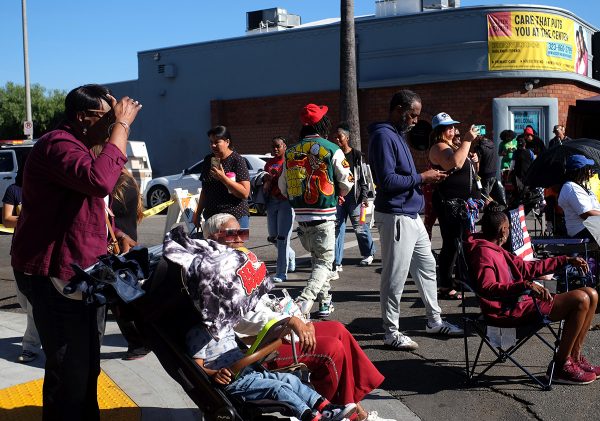
They also handed out flyers introducing residents to the site’s resources, which include: hygiene kits, HIV testing, a free monthly farmers market and clothing closet, mental health and primary care services, substance use and recovery programs, as well as social groups that prioritize LGBTQ+ people of color living in the neighborhood.
Center South opened six years ago, reclaiming a space that once housed a vibrant jazz supper club. At first, the site focused on providing services specifically for men who have sex with men (MSM), regardless of whether or not they identified as a member of the LGBTQ+ community. Over time, Center South became more inclusive of and responsive to the local community as a whole, becoming a safe space for anyone in South L.A. seeking refuge and care.
Campa, who has been with Center South since its founding, emphasized the constantly-evolving nature of the place as it molds itself to best serve and represent its community. Staff members and clinicians are nurtured by their own personal connections to the neighborhood, yearning to give back to the place that raised them.
And that has an effect. “How does it look to have a provider who’s queer: a provider that looks like folks in the community?” Campa said. “We’re our community. Folks grew up [here]…To speak to the MLK Day parade, this was a holiday for the Center. Folks chose to be here. Understanding that we are on MLK Boulevard, we want to continue to do [show up] every year to provide a safe space for the community.”
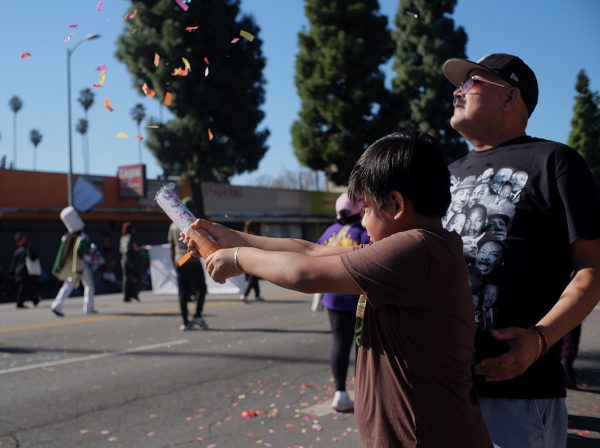
Campa, his staff members, and fellow Los Angeles LGBT Center staff want to expand what it means to be safe and healthy — and to see that reflected more broadly in their communities. “A healthy person needs medical care [and more],” said the Center’s chief equity officer, Giovanna Fischer, who showed up on Monday to celebrate the parade with the community. “[They also] need food access, immigration support…That’s definitely going to impact their health and wellbeing,” Fischer told the Blade. “
Campa, Fischer, and other advocates are strategizing for their community in uncertain times, as threats to instrumental funding are seemingly always on the table. But as they “forecast for the future” and continue to build a collective vision that uplifts LGBTQ+ people of color, their fight endures. “We deserve to think about where we want to go,” Fischer said. “We deserve the opportunity to dream and scheme, and so does our community. So until further notice, we’re going to continue to do that.”
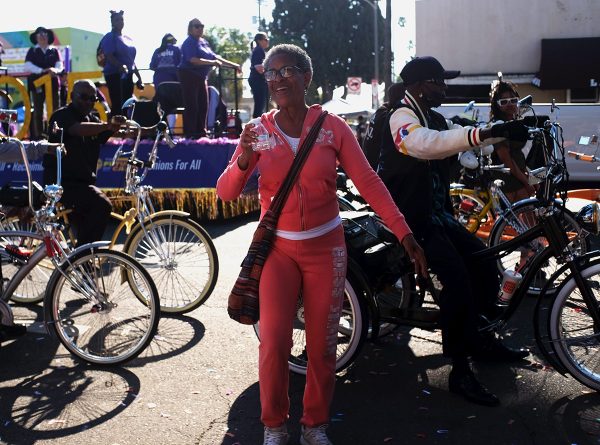
Kristie Song is a California Local News Fellow placed with the Los Angeles Blade. The California Local News Fellowship is a state-funded initiative to support and strengthen local news reporting. Learn more about it at fellowships.journalism.berkeley.edu/cafellows.
Los Angeles
Advocates demand that trans youth be protected as cases are argued in Supreme Court
This week, LGBTQ+ advocates and legal experts spoke in support of trans youth as two Supreme Court cases challenge their rights and safety.

This Tuesday, the Supreme Court heard oral arguments regarding two cases about transgender girls in sports: Little v. Hecox and West Virginia v. B.P.J.
In 2020, Idaho Governor Brad Little signed into law HB 500, which bans transgender girls and women from participating in school sports. This affected the first case’s respondent: transgender student athlete Lindsay Hecox, who was barred from participating in the track and cross country teams as well as intramural soccer and running clubs.
In 2021, then-governor of West Virginia, Jim Justice, approved HB 3293, which enacts a similar ban. Becky Pepper-Jackson (B.P.J.), now an incoming high school student, opposed the discriminatory policy when it prevented her from joining her then-middle school’s cross country and track and field teams. Pepper-Jackson has also only undergone female puberty due to gender-affirming care, but West Virginia argues that its anti-transgender policies should be upheld because of her assigned sex at birth.
For LGBTQ+ advocates and allies, these cases illustrate the burden and harm transgender people face daily as their rights to privacy, dignity, care, and inclusion are constantly at risk of being eroded and stripped completely.
Experts also wonder if these cases could potentially reshape the Constitution’s Equal Protection Clause as well as the civil rights law, Title IX. The former prohibits discrimination on other factors aside from race, though governments have argued that certain “suspect classifications” can be looked at more closely through “heightened scrutiny.” The latter prohibits sex-based discrimination in federally-funded schools.
What is unfolding and how local advocates are informing change:
The fight ahead is weary, and experts are certain that the states involved will not concede their points. In a webinar organized yesterday by the Williams Institute, several LGBTQ+ policy experts, including Rutgers Law School professor and anti-discrimination scholar Katie Eyer, examined where these cases may be heading, as well as efforts to muddy the arguments.
“It seems possible that the court might try to sidestep that issue here by saying that these laws don’t target transgender people at all,” Eyer said. “I think for most people, this seems bananas: like an upside-down world. We all know these laws were about transgender people.”
Jenny Pizer, an attorney for the LGBTQ+ civil rights legal organization Lambda Legal and a co-counsel member for the B.P.J. case, affirmed this sentiment at a press conference organized Tuesday by Lambda Legal and AIDS Healthcare Foundation affinity group, FLUX. “They’ve gone to great lengths to say there’s no discrimination,” Pizer said. “[They’re arguing] it’s just technicalities or classifications.”
Eyer was one of three Equal Protections scholars who filed an amicus brief to be considered in the Supreme Court cases. An amicus brief is a legal document submitted by someone who is not involved directly in a case but who may offer additional perspectives and information that can inform the ruling process.
Eyer’s brief provided historical context that clarified the disadvantages of blanket sex-based policies. These types of laws, according to Eyer, uphold stereotypes over nuance, truth, and equal protection guidelines. For Pepper-Jackson, who has only undergone female puberty and who does not “benefit” from what dissidents define as a sex-based competitive “advantage,” the state should have provided her the ability to argue that she should have the same rights as other girls.
“Of course, the state hasn’t done that here,” Eyer said. “Under these precedents, the Supreme Court should invalidate the laws as applied to those trans girls who really don’t have a sex-based competitive advantage.”
Who are these bills protecting?
The states argue that their policies are merely “ensuring safety and fairness in girls’ sports.” But queer advocates understand that this is a veneer for the exclusion of transgender people from society. Forcing trans youth out of sports “does not protect anyone,” according to California LGBTQ Health and Human Services Network director Dannie Ceseňa, who spoke at Tuesday’s press conference.
“It encourages the scrutiny of children’s bodies. It fuels gender policing, and it creates hostile school environments — not safer ones,” said Ceseňa. “Our youth should not inherit a world that treats their existence as a threat.”
Transgender people are systemically disempowered
At yesterday’s webinar, Distinguished Visiting Scholar at the Williams Institute Andrew Flores discussed his own amicus brief in support of Pepper-Jackson. The brief highlights the need for “heightened judicial scrutiny” in Pepper-Jackson’s case because the majority of political processes “systemically fail” transgender people.
For example, the transgender community faces substantial barriers in exercising their voter rights because of voter identification laws and other policies that regulate and define identity. “Even being able to gain access to the franchise is a burden for transgender people,” Flores said. “The court does play an important role there. It can grant legitimacy to arguments…or at least [acknowledge] that these issues are more complicated than maybe how they’ll receive them.”
What’s next?
Experts are hesitant about where the cases stand. “Bottom line: I don’t know what the court is going to do in these cases. They may send them back down for further development,” Pizer said, who thinks future rulings will not shift more overarching policies regarding transgender rights. “I think they will probably decide based only on laws about sports, not laws more broadly about the rights of trans folks.”
But whatever is decided, the impacts will trickle down to everyone. While the cases deal specifically with anti-transgender policies, experts warn that LGBTQ+ issues have always been tied to racial, economic, and disability justice. “There’s this looming constitutional campaign to really undermine civil rights,” said Eyer. “That affects LGBTQ people. It affects people of color. It affects people with disabilities. It affects everybody, and it really is concerning.”
As transgender inclusion and safety are being argued on the largest legal stage, advocates are asking: “When are you going to step up?” They are also sending a direct message to transgender youth: “We see you, we believe in you, and we are fighting for you,” said Ceseňa. “You deserve joy, community, and care. You deserve a future that reflects who you are and not who anyone or any politician demands you to be. Trans youth deserve better.”
Kristie Song is a California Local News Fellow placed with the Los Angeles Blade. The California Local News Fellowship is a state-funded initiative to support and strengthen local news reporting. Learn more about it at fellowships.journalism.berkeley.edu/cafellows.
U.S. Supreme Court
Competing rallies draw hundreds to Supreme Court
Activists, politicians gather during oral arguments over trans youth participation in sports

Hundreds of supporters and opponents of trans rights gathered outside of the United States Supreme Court during oral arguments for Little v. Hecox and West Virginia v. B.P.J. on Tuesday. Two competing rallies were held next to each other, with politicians and opposing movement leaders at each.
“Trans rights are human rights!” proclaimed U.S. Sen. Ed Markey (D-Mass.) to the crowd of LGBTQ rights supporters. “I am here today because trans kids deserve more than to be debated on cable news. They deserve joy. They deserve support. They deserve to grow up knowing that their country has their back.”

“And I am here today because we have been down this hateful road before,” Markey continued. “We have seen time and time again what happens when the courts are asked to uphold discrimination. History eventually corrects those mistakes, but only after the real harm is done to human beings.”
View on Threads
U.S. Education Secretary Linda McMahon spoke at the other podium set up a few feet away surrounded by signs, “Two Sexes. One Truth.” and “Reality Matters. Biology Matters.”
“In just four years, the Biden administration reversed decades of progress,” said McMahon. “twisting the law to urge that sex is not defined by objective biological reality, but by subjective notion of gender identity. We’ve seen the consequences of the Biden administration’s advocacy of transgender agendas.”

U.S. Rep. Mark Takano (D-Calif.), chair of the Congressional Equality Caucus, was introduced on the opposing podium during McMahon’s remarks.
“This court, whose building that we stand before this morning, did something quite remarkable 6 years ago.” Takano said. “It did the humanely decent thing, and legally correct thing. In the Bostock decision, the Supreme Court said that trans employees exist. It said that trans employees matter. It said that Title VII of the Civil Rights Act protects employees from discrimination based on sex, and that discrimination based on sex includes discrimination based on gender identity and sexual orientation. It recognizes that trans people have workplace rights and that their livelihoods cannot be denied to them, because of who they are as trans people.”
“Today, we ask this court to be consistent,” Takano continued. “If trans employees exist, surely trans teenagers exist. If trans teenagers exist, surely trans children exist. If trans employees have a right not to be discriminated against in the workplace, trans kids have a right to a free and equal education in school.”
Takano then turned and pointed his finger toward McMahon.
“Did you hear that, Secretary McMahon?” Takano addressed McMahon. “Trans kids have a right to a free and equal education! Restore the Office of Civil Rights! Did you hear me Secretary McMahon? You will not speak louder or speak over me or over these people.”
Both politicians continued their remarks from opposing podiums.
“I end with a message to trans youth who need to know that there are adults who reject the political weaponization of hate and bigotry,” Takano said. “To you, I say: you matter. You are not alone. Discrimination has no place in our schools. It has no place in our laws, and it has no place in America.”
Congress
Padilla speaks at ‘ICE Out for Good’ protest in D.C.
ICE agent killed Renee Nicole Good in Minneapolis on Jan. 7
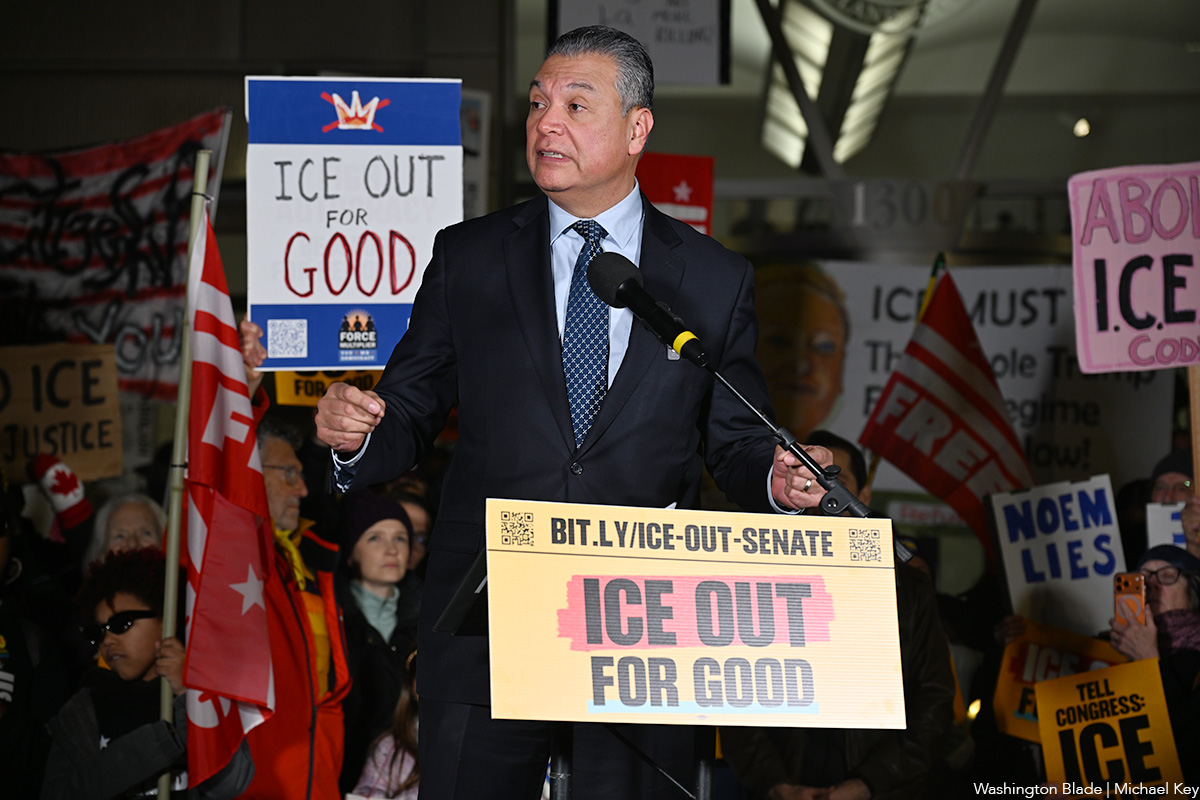
U.S. Sen. Alex Padilla (D-Md.) is among those who spoke at an “ICE Out for Good” protest that took place outside U.S. Customs and Border Protection’s headquarters in D.C. on Tuesday.
The protest took place six days after a U.S. Immigration and Customs Enforcement agent shot and killed Renee Nicole Good, a 37-year-old woman in Minneapolis.
Good left behind her wife and three children.
(Video by Michael K. Lavers)
U.S. Supreme Court
Supreme Court hears arguments in two critical cases on trans sports bans
Justices considered whether laws unconstitutional under Title IX

The Supreme Court heard two cases today that could change how the Equal Protection Clause and Title IX are enforced.
The cases, Little v. Hecox and West Virginia v. B.P.J., ask the court to determine whether state laws blocking transgender girls from participating on girls’ teams at publicly funded schools violates the 14th Amendment’s Equal Protection Clause and Title IX. Once decided, the rulings could reshape how laws addressing sex discrimination are interpreted nationwide.
Chief Justice John Roberts raised questions about whether Bostock v. Clayton County — the landmark case holding that Title VII of the Civil Rights Act of 1964 protects employees from discrimination based on sexual orientation or gender identity — applies in the context of athletics. He questioned whether transgender girls should be considered girls under the law, noting that they were assigned male at birth.
“I think the basic focus of the discussion up until now, which is, as I see it anyway, whether or not we should view your position as a challenge to the distinction between boys and girls on the basis of sex or whether or not you are perfectly comfortable with the distinction between boys and girls, you just want an exception to the biological definition of girls.”
“How we approach the situation of looking at it not as boys versus girls but whether or not there should be an exception with respect to the definition of girls,” Roberts added, suggesting the implications could extend beyond athletics. “That would — if we adopted that, that would have to apply across the board and not simply to the area of athletics.”
Justice Clarence Thomas echoed Roberts’ concerns, questioning how sex-based classifications function under Title IX and what would happen if Idaho’s ban were struck down.
“Does a — the justification for a classification as you have in Title IX, male/female sports, let’s take, for example, an individual male who is not a good athlete, say, a lousy tennis player, and does not make the women’s — and wants to try out for the women’s tennis team, and he said there is no way I’m better than the women’s tennis players. How is that different from what you’re being required to do here?”
Justice Samuel Alito addressed what many in the courtroom seemed reluctant to state directly: the legal definition of sex.
“Under Title IX, what does the term ‘sex’ mean?” Alito asked Principal Deputy Solicitor General Hashim Mooppan, who was arguing in support of Idaho’s law. Mooppan maintained that sex should be defined at birth.
“We think it’s properly interpreted pursuant to its ordinary traditional definition of biological sex and think probably given the time it was enacted, reproductive biology is probably the best way of understanding that,” Mooppan said.
Justice Sonia Sotomayor pushed back, questioning how that definition did not amount to sex discrimination against Lindsay Hecox under Idaho law. If Hecox’s sex is legally defined as male, Sotomayor argued, the exclusion still creates discrimination.
“It’s still an exception,” Sotomayor said. “It’s a subclass of people who are covered by the law and others are not.”
Justice Elena Kagan highlighted the broader implications of the cases, asking whether a ruling for the states would impose a single definition of sex on the 23 states that currently have different laws and standards. The parties acknowledged that scientific research does not yet offer a clear consensus on sex.
“I think the one thing we definitely want to have is complete findings. So that’s why we really were urging to have a full record developed before there were a final judgment of scientific uncertainty,” said Kathleen Harnett, Hecox’s legal representative. “Maybe on a later record, that would come out differently — but I don’t think that — ”

“Just play it out a little bit, if there were scientific uncertainty,” Kagan responded.
Justice Brett Kavanaugh focused on the impact such policies could have on cisgender girls, arguing that allowing transgender girls to compete could undermine Title IX’s original purpose.
“For the individual girl who does not make the team or doesn’t get on the stand for the medal or doesn’t make all league, there’s a — there’s a harm there,” Kavanaugh said. “I think we can’t sweep that aside.”
Justice Amy Coney Barrett questioned whether Idaho’s law discriminated based on transgender status or sex.
“Since trans boys can play on boys’ teams, how would we say this discriminates on the basis of transgender status when its effect really only runs towards trans girls and not trans boys?”
Harnett responded, “I think that might be relevant to a, for example, animus point, right, that we’re not a complete exclusion of transgender people. There was an exclusion of transgender women.”
Justice Ketanji Brown Jackson challenged the notion that explicitly excluding transgender people was not discrimination.
“I guess I’m struggling to understand how you can say that this law doesn’t discriminate on the basis of transgender status. The law expressly aims to ensure that transgender women can’t play on women’s sports teams… it treats transgender women different than — than cis-women, doesn’t it?”
Idaho Solicitor General Alan Hurst urged the court to uphold his state’s ban, arguing that allowing participation based on gender identity — regardless of medical intervention — would deny opportunities to girls protected under federal law.
Hurst emphasized that biological “sex is what matters in sports,” not gender identity, citing scientific evidence that people assigned male at birth are predisposed to athletic advantages.
Joshua Block, representing B.P.J., was asked whether a ruling in their favor would redefine sex under federal law.
“I don’t think the purpose of Title IX is to have an accurate definition of sex,” Block said. “I think the purpose is to make sure sex isn’t being used to deny opportunities.”
Becky Pepper-Jackson, identified as plaintiff B.P.J., the 15-year-old also spoke out.
“I play for my school for the same reason other kids on my track team do — to make friends, have fun, and challenge myself through practice and teamwork,” said Pepper-Jackson. “And all I’ve ever wanted was the same opportunities as my peers. But in 2021, politicians in my state passed a law banning me — the only transgender student athlete in the entire state — from playing as who I really am. This is unfair to me and every transgender kid who just wants the freedom to be themselves.”

Outside the court, advocates echoed those concerns as the justices deliberated.
“Becky simply wants to be with her teammates on the track and field team, to experience the camaraderie and many documented benefits of participating in team sports,” said Sasha Buchert, counsel and Nonbinary & Transgender Rights Project director at Lambda Legal. “It has been amply proven that participating in team sports equips youth with a myriad of skills — in leadership, teamwork, confidence, and health. On the other hand, denying a student the ability to participate is not only discriminatory but harmful to a student’s self-esteem, sending a message that they are not good enough and deserve to be excluded. That is the argument we made today and that we hope resonated with the justices of the Supreme Court.”
“This case is about the ability of transgender youth like Becky to participate in our schools and communities,” said Joshua Block, senior counsel for the ACLU’s LGBTQ & HIV Project. “School athletics are fundamentally educational programs, but West Virginia’s law completely excluded Becky from her school’s entire athletic program even when there is no connection to alleged concerns about fairness or safety. As the lower court recognized, forcing Becky to either give up sports or play on the boys’ team — in contradiction of who she is at school, at home, and across her life — is really no choice at all. We are glad to stand with her and her family to defend her rights, and the rights of every young person, to be included as a member of their school community, at the Supreme Court.”
The Supreme Court is expected to issue rulings in both cases by the end of June.
West Hollywood
John Heilman and Danny Hang will serve as WeHo’s new Mayor and Vice Mayor
Last night, community members and local officials gathered to celebrate new leadership and bid a warm farewell to outgoing Mayor Chelsea Byers.
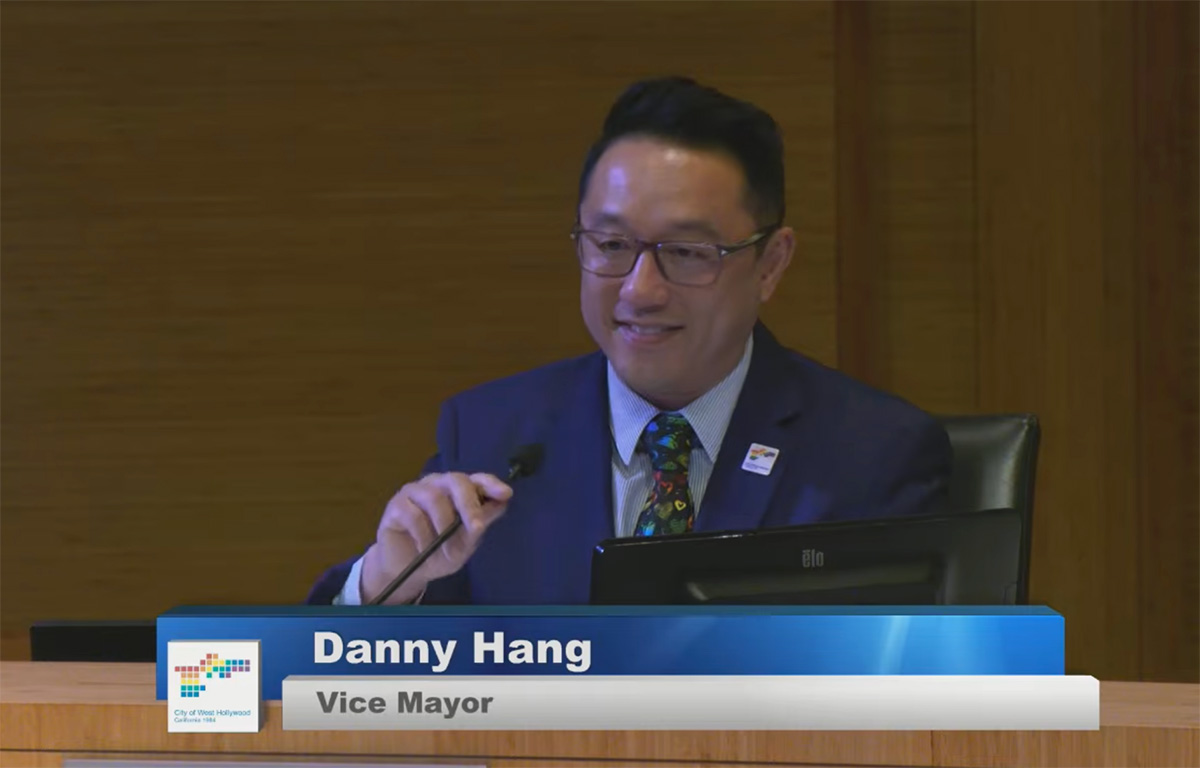
On Jan. 12, West Hollywood residents packed the City’s chambers at 6 p.m. to honor the work of outgoing mayor Chelsea Byers and witness councilmembers John Heilman and Danny Hang take their oath of office as they respectively assume their roles as Mayor and Vice Mayor for 2026.
In her last address as Mayor, Byers spoke about the optimism she holds onto in these unsteady times. To her, West Hollywood is a unique City: one that has become a model for what can be possible in an unjust society. “It’s us against the world. It’s West Hollywood on the stage,” Byers said. “It’s our story to tell, and every single person here contributes in such great ways to that.”
Byers was awarded a plaque on behalf of West Hollywood council members for her outspoken commitment to LGBTQ+ rights, economic justice, housing affordability, and policies that emphasize equity and inclusivity in West Hollywood.
Her leadership remains a bright, guiding light for Mayor Heilman, who was part of West Hollywood’s first city council after the independent city was incorporated in 1984. The spirit of that initial group remains today: queer, progressive, and led for and by the people. Yesterday’s ceremony marked the beginning of Heilman’s ninth time serving as Mayor, as well as his last year on the city council due to term limits.
Now, he leads side-by-side with a self-proclaimed “newcomer,” Danny Hang.
From the 626 to the Westside: Hang’s roots and journey
Hang was born in Monterey Park, a city in the San Gabriel Valley. The region is known for its diverse communities and AAPI-rich culture and history, and Hang recounted to the Blade the deep sense of belonging and comfort he felt growing up there. “I could go to a restaurant, speak Vietnamese or Chinese,” Hang said. “There are people who look like me out there. It is my home away from home.”
After college, he worked at the Social Security Administration, where he helped retirees, disabled people, and those impacted by loss file for Supplemental Security Income (SSI). The work was fulfilling, and he loved feeling that he had a tangible impact on others’ lives: that he could help residents grappling with difficult bureaucratic processes.
This passion grabbed the attention of L.A. County Supervisor Lindsey Horvath, who tapped Hang into serving on West Hollywood’s Disabilities Advisory Board in 2017. Hang eagerly accepted the role, having always been drawn to the vibrant, queer cultural hub. “WeHo was always the land of the unicorn: the land of magic,’ Hang told the Blade. “[This] was a town where I could be open, by myself, and find other people who were also LGBTQ+.”
After serving on the City’s Disabilities Advisory Board and, subsequently, the county’s Business License Commission, Hang noticed a lack of AAPI representation in local leadership. “There aren’t many AAPI people at all in West Hollywood. After I was on the commission, [I thought]: Hey, I think I want to run for city council,” Hang told the Blade.
Creating more inclusive leadership in WeHo
In 2024, Hang was elected to West Hollywood’s city council, becoming the first AAPI councilmember in the City’s 40 year legacy. “I want to see people who look like me in local government, because I want this community to be reflective of the modern-day people who live here. We’re a diverse community, and there’s no reason why we shouldn’t have people of color on the council, as well as more people of color appointed to our boards and commissions.”
Last night, local officials offered encouragement, support, and affirmation to Hang after he took his oath of office. “You’re already making history and certainly making waves across, not just your home region of the San Gabriel Valley, but certainly in California,” said Monterey Park councilmember Henry Lo.
Afterwards, Hang addressed the room, thanking residents, fellow council members and his family. “Standing here as the first AAPI elected to the West Hollywood City Council is deeply meaningful, and I couldn’t have done it without my parents. [They’re] right here in the front row,” Hang said. “My dad was a union worker, who showed me why standing up for workers matters. And my mom worked in a small business, owning a little nail salon in South Pasadena. She taught me what it means to care for others and to keep the community going.”
The year ahead: Heilman calls for residents to unite
Afterwards, Mayor Heilman spoke at length about the upcoming transitional year, the urgency of the current political climate, and ways that community members can step up to support each other. In his last term, he has set his eye on revitalizing the Sunset Strip, stabilizing rent and increasing housing affordability as well as examining the safety of the City’s foundational buildings, including the library and fire station.
He concluded his speech by making an unwavering stance on the “appalling” state of the federal government, stating that every West Hollywood resident must step up together in the face of ongoing federal attacks on the rights of LGBTQ+ people, specifically transgender people, as well as immigrants and other marginalized community members.
“This is a direct attack on our residents. It’s a direct attack on all of us,” Heilman said. “Now is not the time to hide. We need you…Ask what you can do to help people in the community,” he said, galvanizing residents to volunteer for the City’s various social services, nonprofits like Hollywood Food Coalition and Ascencia.
This call for unity and communal bravery echoes Byers’ belief in the courage of the people of West Hollywood. “41 years ago, a group of people defined what government could be,” Byers said. “We’re living the wildest dreams of people decades ago…and we get to be a bridge for that hope for the future. In such a critical moment, it’s truly our responsibility.”
Kristie Song is a California Local News Fellow placed with the Los Angeles Blade. The California Local News Fellowship is a state-funded initiative to support and strengthen local news reporting. Learn more about it at fellowships.journalism.berkeley.edu/cafellows.
Arts & Entertainment
2026 Most Eligible LGBTQ Singles nominations
We are looking for the most eligible LGBTQ singles in Los Angeles

Are you or a friend looking to find a little love in 2026? We are looking for the most eligible LGBTQ singles in Los Angeles. Nominate you or your friends until January 23rd using the form below or by clicking HERE.
Our most eligible singles will be announced online in February.
Minnesota
Reports say woman killed by ICE was part of LGBTQ community
Renee Nicole Good shot in Minneapolis on Wednesday

A U.S. Immigration and Customs Enforcement agent shot and killed a woman in Minneapolis as she attempted to drive away from law enforcement during a protest on Wednesday.
The Star Tribune newspaper identified the victim as Renee Nicole Good, 37, a Minneapolis resident who lived blocks from where she was shot in the Central neighborhood, according to reports. Donna Ganger, Good’s mother, told the Star Tribune that her daughter lived in the Twin Cities with her wife.
Multiple videos of the shooting have gone viral on social media, showing various angles of the fatal incident — including footage that shows Good getting into her car and attempting to drive away from law enforcement officers, who had their weapons drawn.
In the videos, ICE agents can be heard telling Good to “get out of the fucking car” as they attempted to arrest her. Good, who press reports say was married to a woman, ended up crashing her car into an electric pole and other vehicles. She was later transported from the scene of the shooting and died at the hospital.
President Donald Trump defended the ICE agent on Truth Social, saying the officer was “viciously” run over — a claim that coincides with Homeland Security Secretary Kristi Noem’s assessment of the situation. Noem, a South Dakota Republican, insisted the officer “fired defensive shots” at Good after she attempted to run over law enforcement agents “in an attempt to kill them — an act of domestic terrorism.”
Multiple state and local officials disputed claims that the shooting was carried out in self-defense at the same time Noem was making those assertions.
An Instagram account that appears to belong to Good describes her as a “poet and writer and wife and mom and shitty guitar strummer from Colorado; experiencing Minneapolis, MN,” accompanied by a rainbow flag emoji.
A video posted to X after the shooting shows a woman, reportedly her wife, sitting on the ground, crying and saying, “They killed my wife. I don’t know what to do.”
“We’ve dreaded this moment since the early stages of this ICE presence in Minneapolis,” Mayor Jacob Frey said during a Wednesday press conference. “Having seen the video myself, I want to tell everybody directly that [the DHS’s claim of self-defense] is bullshit. This was an agent recklessly using power that resulted in somebody dying, getting killed.”
“I have a message for ICE. To ICE, get the fuck out of Minneapolis,” Frey continued. “We do not want you here. Your stated reason for being in this city is to create some kind of safety, and you are doing exactly the opposite. People are being hurt. Families are being ripped apart. Long-term Minneapolis residents that have contributed so greatly to our city, to our culture, to our economy are being terrorized, and now somebody is dead. That’s on you, and it’s also on you to leave.”
Across the Capitol, members of the House and the Senate condemned the actions of the officer.
“There’s no indication she’s a protester, there’s nothing that at least you can see on the video, and therefore nothing that the officers on the ground could see that identify her as someone who’s set out to try to do harm to an ICE officer,” U.S. Sen. Elizabeth Warren (D-Mass.) said Wednesday night on MS NOW’s “The Weeknight.”
“There is no evidence that has been presented to justify this killing,” House Minority Leader Hakeem Jeffries (D-N.Y.) said in a statement on his website. “The masked ICE agent who pulled the trigger should be criminally investigated to the full extent of the law for acting with depraved indifference to human life.”
“ICE just killed someone in Minneapolis,” U.S. Rep. Robert Garcia (D-Calif.) the highest-ranking Democrat on the House Oversight Committee, posted on X. “This administration’s violence against communities across our country is horrific and dangerous. Oversight Democrats are demanding answers on what happened today. We need an investigation immediately.”
In a statement to the Advocate, Human Rights Campaign President Kelley Robinson wrote, “Today, a woman was senselessly killed in Minneapolis during an ICE action — a brutal reminder that this agency and the Trump regime put every community at risk, spreading fear instead of safety. Reports that she may have been part of the LGBTQ+ community underscore how often the most vulnerable pay the highest price.”
National LGBTQ Task Force President Kierra Johnson also responded to Good’s death.
“We recognize and mourn the loss of Renee Nicole Good and extend our condolences to her family, loved ones, and community,” said Johnson in a statement. “This loss of life was preventable and reprehensible, particularly coming at the hands of federal agents.”
-

 a&e features4 days ago
a&e features4 days agoWriting her own story arc: Stuntwoman Ellie Haigh takes on Hollywood
-

 Movies3 days ago
Movies3 days ago‘Becoming a Man in 127 EASY Steps’ changes the narrative when it comes to LGBTQ storytelling
-
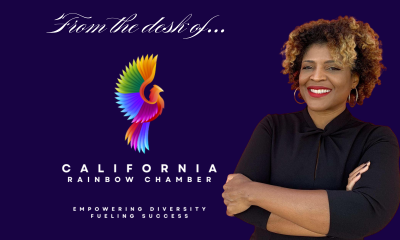
 Business3 days ago
Business3 days agoQueer business trends to watch in California for 2026
-

 a&e features4 days ago
a&e features4 days agoEveryone should be a little more like Van Goth
-

 Television3 days ago
Television3 days ago‘Pluribus,’ ‘The Pitt,’ and ‘Charlie’s Angels’ 50th anniversary among 2026 PaleyFest LA line-Up
-

 Books3 days ago
Books3 days ago‘The Director’ highlights film director who collaborated with Hitler
-

 Sports11 hours ago
Sports11 hours agoOut Athlete Fund is supporting 6 queer athletes on their way to the 2026 Winter Olympics
-

 a&e features1 day ago
a&e features1 day ago“I just kept showing up”: Broadway veteran Marc Shaiman reflects on musical success stories
-

 Movies1 day ago
Movies1 day agoVan Sant returns with gripping ‘Dead Man’s Wire’
-

 a&e features19 hours ago
a&e features19 hours agoAlexander Skarsgård describes ‘Pillion’ in 3 words: lube, sweat, leather

